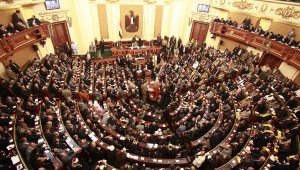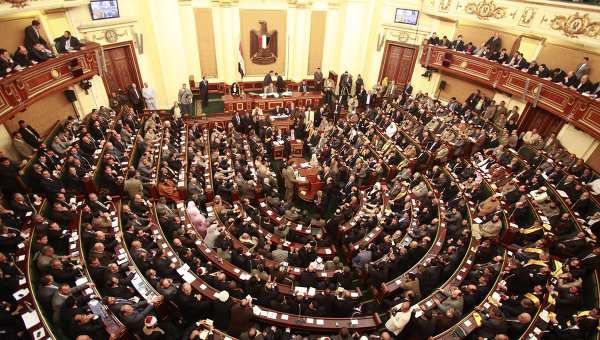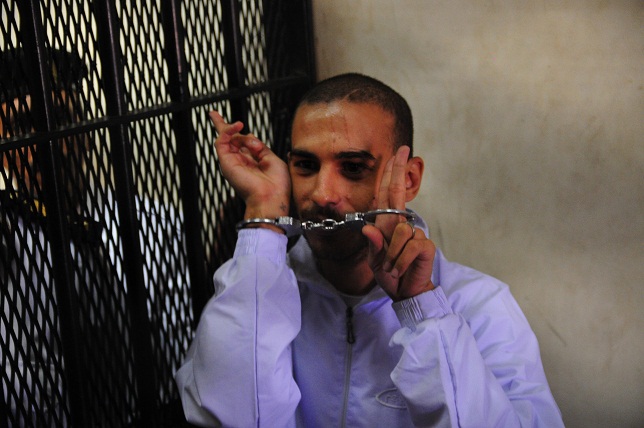
(AFP File Photo)
The committee in charge of amending the parliamentary law under the supervision of Minister of Transitional Justice Ibrahim El-Heneidy presented its final draft to the cabinet for approval on Wednesday.
Over the course of three weeks, the committee, along with the cabinet, organised two meetings for social dialogue with representatives of different political parties.
“The government was not really serious about open discussions,” Maasoum Marzouk, member of the Popular Alliance Party under establishment told Daily News Egypt Wednesday. “It felt like [Prime Minister Ibrahim] Mehleb was doing all the talk and that the presence of politicians was not even necessary.”
This comes as Egypt’s parliamentary elections are back on the table after being interrupted for a month and a half by the annulment of the law dividing electoral districts. The law’s annulment came in a decision by the Supreme Constitutional Court on 1 March.
Following the court order, President Abdel Fattah Al-Sisi granted the committee one month to adjust the law. This occurred amidst widespread controversy on the non-constitutionality of several articles in three laws organising Egypt’s political life.
The main issue from the government’s point of view was the flawed law distributing individual parliamentary seats over electoral districts. The number of elected individual seats in the initial law issued by the president was 420 out of the total 567 seats.
The committee increased those seats to 442, whilst allocating a total of 120 elected seats to the closed-list systems, dividing the country into four main electoral districts.
Unlike the state, political parties saw further problems that would lead, in their opinion, to an unbalanced and unrepresentative parliament. They argued that this would give less space for political entities to the advantage of powerful and wealthier candidates, mainly politicians from the regime of Hosni Mubarak.
Most importantly, politicians sought a reform in the electoral system itself, demanding the inclusion of representative lists. Nonetheless, Al-Wafd Party Deputy Assistant Safir Nour said their demands were ignored by the committee, which only invited them to discussion towards the deadline.
However, politicians did not express a desire to object the law about to be issued, despite not being satisfied with it. In fact, Nour described attempts of appealing the upcoming law before court “childish acts aimed at obstructing the electoral process”.
Meanwhile, heads and representatives of more than ten political parties participated in an open discussion and press conference Wednesday organised by Maat Foundation for Peace, Development and Human Rights hosting the International Observation Mission of the elections.
Given parliamentary elections will take place in unstable political and security conditions, discussions mainly revolved around increasing terrorism and counterterrorism efforts and its effects on the electoral process.
In general, politicians agreed that ongoing deadly attacks on security officers and citizens will not prevent parliamentary elections from happening. However, they shared different opinions on what causes terrorism and extremism to grow and more effective strategies to combat it, such as improving media rhetoric that they considered “insightful to violence”.
According to Maat’s observatory report, there have been over 1,000 incidents of violence during the first quarter of 2015. These include the targeting of civilians, police and military personnel, public institutions and facilities, universities and schools, judges and courts, and houses of worship.
Nonetheless, Marzouk believes that terrorism is a result, not a cause, of the current political situation, which is based on centralised power. “There is also an exaggeration in the security speech which ends in restrictions on freedoms earned by the people through blood during the 25 January revolution,” he said.
Mohamed Sami, president of Al-Karama Party, agreed on the idea that narratives of emergency security situations aimed at annulling democratic systems is going to fail both counterterrorism efforts and effective democratic transition.
“I completely oppose this approach,” Sami stated in a press conference Wednesday. “In my opinion, the more democracy is enhanced by social participation and dialogue, the better the confrontation of terrorism.”
Sami, along with several others, denounced the fact that the youth will “barely” have space in the upcoming parliament, explaining that their chances do not exceed 4% of the total seats. “Most young members think the parliamentary law is a joke and are inclined towards boycotting the elections,” Sami said.
Believing that boycott is an indication of their passivism, Sami said that if the state continues to exclude the young sector from the decision-making process, they would have no other resorts than extremism and violence.
Ahmed Bahaa El-Din, president of the Egyptian Socialist Party, spoke of other practices he considered types of ‘terrorism’.
“When hundreds of factory workers organise a strike because they have not been paid in ten months, they come with barrels full of gas ready to attack out of desperation. They are dispersed and arrested, then thrown in prison. This is terrorism,” he said.
“When the State uses the Protest Law to oppress freedom of expression, bans political participation and jails young activists, this is once more terrorism,” Bahaa El-Din added. He explained that an atmosphere where there is social injustice and absence of the poor’s rights, it becomes “favourable” to terrorism.
“I think the state should rush measures related to such issues just as they were able to provide wealthy foreign investors with facilitations ahead of the Economic Summit,” he concluded in his speech at the conference.
Some parties also expressed concerns on the monitoring operations of expenses spent on electoral campaigns and whether there would be restrictions on those campaigns’ work with the public. Parliamentary elections remain a controversial debate between state legislators and politicians.

